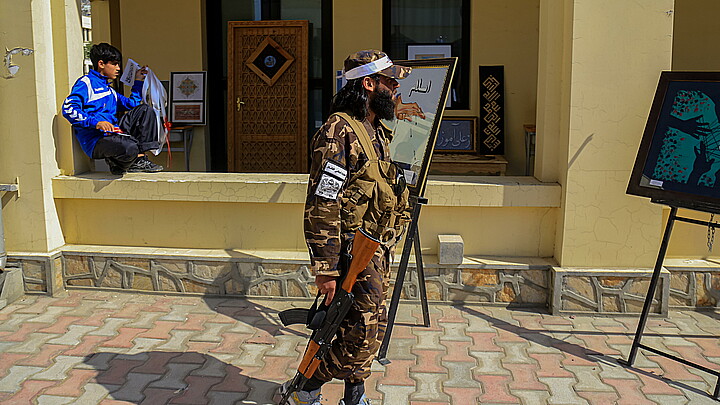Politics
Iran, Taliban rebuffing U.S. diplomacy, upping threats against Americans under Biden
Rogue regimes appear undeterred as Biden administration engages diplomatically
January 11, 2022 9:22am
Updated: January 13, 2022 1:14am
Iran and the Taliban are intensifying their threats against the U.S., spurning the Biden administration's diplomatic outreach to both rogue regimes.
Last month, the Taliban told the U.S. during talks in Doha, Qatar, that it will deploy 2,000 suicide bombers to Washington, D.C., if the Biden administration insists on posting the same number of troops at the U.S. embassy in Kabul, Afghanistan, according to a new report by the Middle East Media Research Institute.
The acting defense minister of the Taliban government in Afghanistan issued an identical threat on Twitter.
"If America wants 2,000 [American] troops at its embassy in Afghanistan, we also want 2,000 Fidayeen Mujahideen [suicide bombers] from the Fateh Force at the embassy of Afghanistan in America," wrote Maulvi Mohammad Yaqoob Mujahid, son of the late Taliban founder Mullah Mohammad Omar.
The U.S. does not recognize the Taliban government in Afghanistan, but the Biden administration continues to engage the Islamist group through diplomatic channels. Qatar has agreed to represent U.S. diplomatic interests in Afghanistan, which the Taliban officially conquered in August as the U.S. withdrew all American troops from the country.
The Taliban's warnings came not long before a senior Taliban official reportedly said that the jihadist group will include suicide bombers as part of a new branch of special forces in the Afghan army.
"Our mujahideen in the Ishtishhadi Kandaks [martyrdom-seeking battalions] will be part of the army and will be Special Forces and organized under the defense ministry," Zabihullah Mujahid said in an interview last week, according to MEMRI. "The Special Forces will be established in a specific number and used for special operations."
Mujahid, a longtime Taliban spokesman, is also deputy minister for information and culture for the new Taliban regime.
Despite the ongoing dialogue between the U.S. and the Taliban, the latter has continued to crack down on dissent and impose new restrictions, especially on women.
The State Department told Just the News that the U.S. has been clear about what the Taliban needs to do to earn legitimacy and seek international recognition.
"There are several fundamental and important questions the Taliban have to answer," a department spokesperson said, listing several such questions, some of which concerned respect for Afghans' human rights and fundamental freedoms.
On Saturday, the Taliban arrested a Kabul university professor who gained national fame after he lambasted a Taliban official in a debate on Afghan television weeks ago. The arrest is part of an ongoing Taliban campaign to hunt down Afghans who criticize the Taliban in person or on social media, according to media reports and human rights groups.
Also last week, the Taliban announced that women in northern Afghanistan are no longer allowed to use communal bathhouses. The use of these bathhouses, or hammams, is, for many people, the only chance for a warm wash during Afghanistan's cold winters. The announcement comes as women across Afghan society now fear for their safety.
The State Department spokesperson also said the Taliban must live up to its "counterterrorism commitments."
In July, Mujahid told an Afghan media outlet that the Taliban was not obligated to sever its longstanding ties with al Qaeda under its agreements with the U.S.
"The relation between Muslims in the world is in faith," he said. "This is not logical at all [to cut ties with al Qaeda]. The issue was also mentioned in our negotiations. We explained this to the Americans."
Like the Taliban, Iran has similarly rebuffed the Biden administration's diplomatic efforts and continued advancing its policies unabated.
In the nuclear realm, the administration offered to lift the economic sanctions imposed by former President Trump if Iran returned to the limits imposed by the 2015 nuclear deal. Instead, Iran has taken steps to enrich uranium to 60% purity — close to the 90%, or weapons-grade, level needed for a nuclear weapon, and far above the limit of 3.67% stated in the deal.
Still, the administration recently seemed to give Iran more leeway to enrich uranium, reducing the U.S. threat of imposing sanctions on the regime.
President Biden's national security adviser, Jake Sullivan, recently told Israeli officials that the U.S. saw so-called snapback sanctions as a way to deter Iran from enriching uranium to 90%, according to Israeli media reports.
Snapback was supposed to be a mechanism by which any party to the nuclear deal could re-trigger all United Nations sanctions on Iran if the regime violated the accord in any way.
Last year, administration officials indicated snapback could encourage Iran to agree to an improved version of the nuclear deal and be used if negotiations to return to the original agreement failed. Sullivan's recent comments threatening snapback only in the event of 90% enrichment indicates the administration has softened its position, acquiescing to Iranian enrichment of uranium right up to the level needed for a nuclear bomb.
The State Department would not comment on the apparent change in Washington's position, but a spokesperson said such reports "highlight the catastrophic failure of the previous administration's decision to cease U.S. participation" in the nuclear deal.
Trump withdrew the U.S. from the nuclear deal in 2018.
"We have noted public comments from senior Iranian officials that they do not intend to increase enrichment to 90%, which would be an exceptionally provocative act," the spokesperson told Just the News. "U.S. diplomats designed and negotiated the snapback mechanism in U.N. Security Council resolution 2231 to provide for consequences if Iran did not adhere to its [nuclear deal] commitments."
As Iran is ramping up its uranium enrichment, it's also targeting Americans and American officials.
Earlier this month, the head of the elite Quds force branch of Iran's Islamic Revolutionary Guard Corps (IRGC), a U.S.-designated terrorist organization, warned that revenge will come for the U.S. for the killing of Gen. Qassem Soleimani.
The "ground for the hard revenge" will come from "within" the homes of Americans, said Gen. Esmail Ghaani, who replaced Soleimani as Quds Force commander.
Iranian President Ebrahim Raisi added that former President Trump and former Secretary of State Mike Pompeo "must face justice and retribution" for their role in Soleimani's death, describing both men as "criminals."
The U.S. killed Soleimani, who many experts believe was the second most powerful Iranian official behind Supreme Leader Ali Khamenei, in January 2020.
Over the weekend, Iran said it sanctioned 52 Americans, including Gen. Mark Milley, chairman of the Joint Chiefs of Staff, and Robert O'Brien, who served as Trump's national security adviser. The regime said these individuals had been blacklisted for "their role in the terrorist crime by the United States against the martyred ... Soleimani and his companions and the promotion of terrorism and violations of fundamental human rights."
Sullivan responded Sunday that Iran will face "severe consequences" should it attack any Americans.
"Make no mistake: The United States of America will protect and defend its citizens," he added. "This includes those serving the United States now and those who formerly served."
Iran has shown a willingness to attack U.S. bases and personnel across the Middle East. Most recently, Iranian-backed militias repeatedly fired rockets at bases in Iraq and Syria housing U.S. forces last week.
A couple days earlier, Iranian-backed proxies targeted Americans in Iraq with drones.










